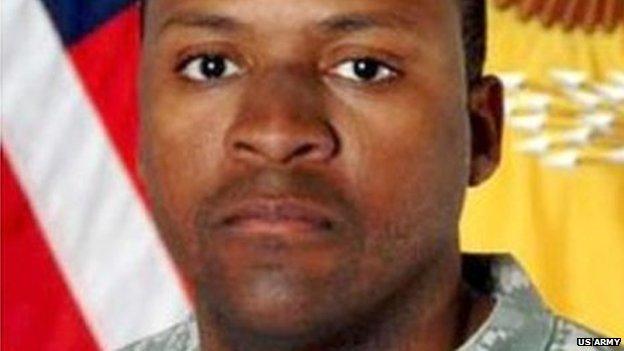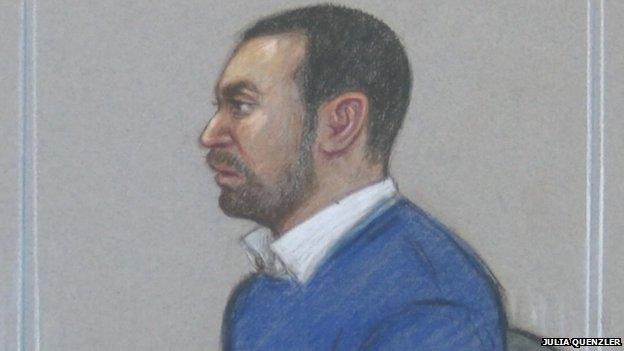US soldier killed by British man's bomb, court hears
- Published

Sergeant Randy Johnson was killed by a bomb in Iraq in September 2007
A British man worked on bombs planted in Iraq that claimed the life of a US soldier, a court has heard.
Sergeant Randy Johnson, 34, was killed in an explosion near Baghdad in 2007, Woolwich Crown Court heard.
The fingerprints of Anis Abid Sardar, from Wembley, London, were allegedly found on two other bombs at the scene, but not that which killed Sgt Johnson.
Mr Sardar, 38, denies murder, conspiracy to murder and conspiracy to cause an explosion.
Prosecutor Max Hill QC told the court: "This is an unusual trial in that almost all of the evidence you will see and hear comes from Iraq.
"The Crown's case is that the defendant Mr Sardar was directly involved in making bombs for use in Iraq during 2007.
"As you will hear, he seems to have been based in Syria, probably in the capital city Damascus at relevant times."
'Deadly intent'
He explained that although the offences took place in Iraq, Mr Sardar is on trial in London as a British citizen.
Mr Hill said the bombs "were not off-the-shelf bombs, they were made with deadly intent".
They were later taken to an FBI laboratory in the US for examination by experts.
Sgt Johnson, of the 2nd Cavalry Regiment, was killed when the armoured vehicle he was travelling in hit a roadside improvised explosive device (IED).

The Stryker vehicles of the US Army's 2nd Cavalry Regiment, seen here on a military exercise
Other US soldiers were seriously injured by the blast and also in a fire-fight while dealing with another IED, the court heard.
Fingerprints found on the bomb that killed Sgt Johnson belonged to another man, Sajjad Adnan, who worked with Mr Sardar, the prosecution said.
Mr Adnan, who is not British, was handed over to the Iraqi authorities after the bombings and his current whereabouts are unknown, Mr Hill said.
Jurors heard Mr Sardar was part of a group that left a number of IEDs buried under the roads west of Baghdad.
The bomb that killed Sgt Johnson was part of a sequence, Mr Hill told the court, "involving bombs concealed geographically quite close together".
Mr Hill said the bomb series was part of a "joint effort by the defendant Mr Sardar, together with Adnan and others".
"That is why it is unnecessary for Mr Sardar to have left his own finger mark on the bomb which killed Sgt Johnson," he said.

In court

Anis Sardar is accused of being directly involved in making bombs for use in Iraq during 2007
Steve Swann, BBC News
The prosecution made clear that this was an "unusual trial in that almost all of the evidence... comes from Iraq."
Nevertheless it is, according to them, lawful to try Anis Sardar here because he is a British citizen who lives and works in London.
It is the first time we have seen a prosecution in this country for charges of making improvised explosive devices (IEDs) during the insurgency in Iraq.
This has been a case a long time in gestation, since Mr Sardar was arrested seven years after the bombs were recovered from a dusty road west of Baghdad.
The jury was told they were forensically analysed by the US authorities in Iraq and America before being examined by British scientists.

Though Mr Sardar claimed to have travelled to Syria in 2007 to learn Arabic, the court heard that police found documents in his London home which suggested he already had an advanced understanding of the language.
Police searching the property also found a bomb-making manual written in Arabic.
The US-led invasion of Iraq began in 2003, amid claims Iraqi leader Saddam Hussein had weapons of mass destruction. It sparked years of violent conflict with different groups competing for power.
British forces ended combat operations in 2009 and the US did so the following year. A total of 179 UK service personnel and nearly 4,500 US soldiers were killed during the conflict.
- Published25 September 2014
